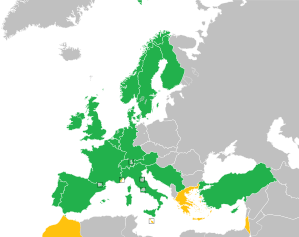ESC 1984
| Eurovision Song Contest 1984 | |
|---|---|
 |
|
| Dates | |
| Final | 5 May 1984 |
| Host | |
| Venue |
Grand Theatre Luxembourg City, Luxembourg |
| Presenter(s) | Désirée Nosbusch |
| Conductor | Pierre Cao |
| Directed by | Rene Steichen |
| Executive supervisor | Frank Naef |
| Host broadcaster | RTL Télévision (RTL) |
| Opening act | In an introductory video, Pierre Cao and the RTL orchestra performed instrumental versions of all the past Eurovision winners from Luxembourg and L'amour est bleu, one of Luxembourg's most popular entries. |
| Interval act | Prague Theatre of Illuminated Drawings |
| Participants | |
| Number of entries | 19 |
| Debuting countries | None |
| Returning countries |
|
| Withdrawing countries |
|
| Vote | |
| Voting system | Each country awarded 12, 10, 8-1 point(s) to their 10 favourite songs |
| Nul points | None |
| Winning song |
"Diggi-Loo Diggi-Ley" |
The Eurovision Song Contest 1984, the 29th event of its kind, was held on 5 May 1984 in Luxembourg. The presenter, Désirée Nosbusch, only 19 years old at the time, hosted the show in a lax manner, which was quite unusual for the show at the time. She manifested her fluency in four languages by switching between a strong transatlantic English, French, German and Luxembourgish in the course of talking, often in the same sentence.
Sweden's the Herreys were the winners of this contest with the song, "Diggi-Loo Diggi-Ley". This was the Nordic country's second win, and the first song performed in Swedish. The previous Swedish winner, ABBA, ten years ago had performed their song "Waterloo" in English.
Israel withdrew from the contest due to Yom Hazikaron (Day of Remembrance for the Fallen Soldiers of Israel and Victims of Terrorism) being commemorated on the same date. Iceland was going to participate but withdrew due to lack of financial support. 1984 is also a notable for the audible booing that could be heard from the audience, particularly at the end of the UK's performance. It was said that the booing was due to English football hooligans having rioted in Luxembourg in November 1983 after being knocked out of the UEFA European Football Championship. However, the song itself managed a pretty good showing, reaching seventh place.
The city of Luxembourg, also known as Luxembourg City, is a commune with city status, and the capital of the Grand Duchy of Luxembourg. It is located at the confluence of the Alzette and Pétrusse Rivers in southern Luxembourg. The city contains the historic Luxembourg Castle, established by the Franks in the Early Middle Ages, around which a settlement developed.
...
Wikipedia


